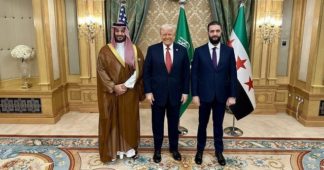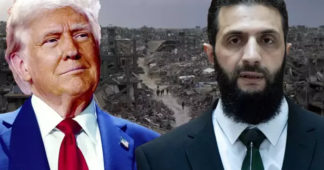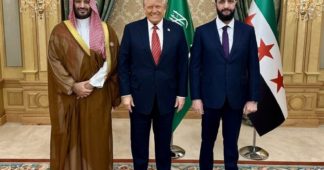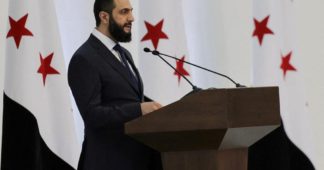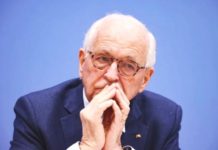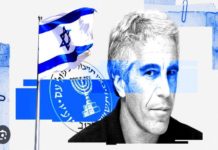President Trump announced that he’s lifting the longstanding U.S. sanctions on Syria and agreeing to sell Saudi Arabia $142 billion in weapons.
On the first day of his trip to the Middle East, President Donald Trump announced that he was lifting the longstanding U.S. sanctions on Syria and agreeing to sell Saudi Arabia $142 billion in weapons.
At an investment forum in Riyadh, Trump told the audience that he had repealed the sanctions at the Saudis’ request. “Oh, what I do for the crown prince,” he said.
“In Syria, which has seen so much misery and death, there is a new government that will hopefully succeed in stabilizing the country and keeping peace,” Trump added. “That’s what we want to see.”
In Saudi Arabia, Trump met with Syria’s interim President Ahmed al-Sharaa and encouraged him to join the Abraham Accords.
On board Air Force One, Trump told reporters that al-Sharaa was a “young, attractive . . . tough guy” with a “strong past” that had a good shot of pulling Syria together.
In 2017, the United States designated al-Sharaa as a global terrorist over his connections to groups like al-Qaeda and ISIS, as well as his involvement in attacks within Syria.
The Syrian leader reportedly courted Trump with a number of incentives, including an offer to build a Trump Tower in Damascus.
In an interview with Democracy Now, HuffPost Senior Diplomatic Correspondent Akbar Shahid Ahmed pointed out that the move could anger pro-Israel supporters.
“This is the culmination of a months long battle within Trump’s own administration that I’ve been reporting on, where there are still many neoconservatives, kind of pro-Israel hard-liners, the folks who have been in the Republican ecosystem for many, many years, who were not supportive of this kind of policy on Syria,” he said. “So, for President Trump to be in Saudi Arabia publicly embracing the Syrian president, not just saying hello, which is what the White House told us he was going to do yesterday — he actually had a more extensive conversation and has expressed a lot of hopes for U.S.-Syria engagement — I think that’s quite striking, right?”
Italian analyst Francesco Salesio Schiavi told Responsible Statecraft that Trump could view al-Sharaa as a potential bulwark against Iran and a force that might stabilize the country after decades of violence.
“While this is far from formal recognition, I think it plants the seeds for a phased normalization process, starting with limited contact and possibly leading to re-engagement on counterterrorism, reconstruction, and border security, provided Sharaa can credibly distance himself from his militant past,” said Schiavi.
The Trump administration referred to its $142 billion weapons package with Saudi Arabia as “the largest defense sales agreement in history.” It’s part of a $600 billion in investment that the country claims it is making in the United States.
“President Trump is the dealmaker in chief, and he has once again secured a historic deal that strengthens America’s economic dominance and global influence,” said the White House in a statement.
The administration says it will be providing Saudi Arabia with “state-of-the-art warfighting equipment and services from over a dozen U.S. defense firms.”
On Wednesday, the Trump team claimed that it had secured a $1.2 trillion agreement with Qatar, which includes “state-of-the-art military equipment” from U.S. defense companies Raytheon and General Atomics.
The administration has been criticized in recent days for accepting a luxury Boeing jet from the country. This week, Senate Minority Leader Chuck Schumer announced that he would hold all Justice Department nominees awaiting Senate confirmation until Trump provides details about the gift.
“The Boeing 747 is being given to the United States Air Force/Department of Defense, NOT TO ME! It is a gift from a Nation, Qatar, that we have successfully defended for many years,” Trump posted on social media. “It will be used by our Government as a temporary Air Force One, until such time as our new Boeings, which are very late on delivery, arrive.”
Trump will visit the United Arab Emirates tomorrow.
The President will not be stopping in Israel on this trip, despite the recent release of Edan Alexander, an Israeli-American held by Hamas.
Alexander’s release was negotiated without the involvement of Israeli Prime Minister Benjamin Netanyahu. Israel was also iced out of the Trump administration’s recent deal with Ansar Allah in Yemen and has been on the sidelines for the current Iran nuclear negotiations.
In Jewish Insider, Gabby Deutch writes that these developments are generating “a quiet panic of sorts among members of the pro-Israel and Jewish communal establishment,” as many believe Trump’s focus on dealmaking has eclipsed ‘traditional foreign policy objectives,’ like unfettered support for Israel.
Deutch cites a message “circulating among insiders” this week: “All the investment in communal organizations and institutions like Congress are meaningless in this moment and pale in comparison to having a sovereign wealth fund that can get Trump to change his tune on Houthis, Iran, Gaza etc.”
We remind our readers that publication of articles on our site does not mean that we agree with what is written. Our policy is to publish anything which we consider of interest, so as to assist our readers in forming their opinions. Sometimes we even publish articles with which we totally disagree, since we believe it is important for our readers to be informed on as wide a spectrum of views as possible.
